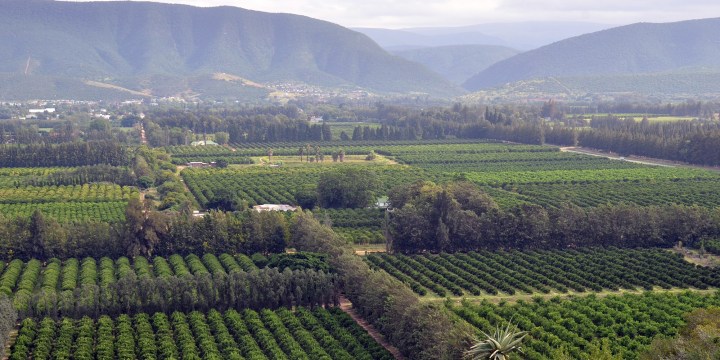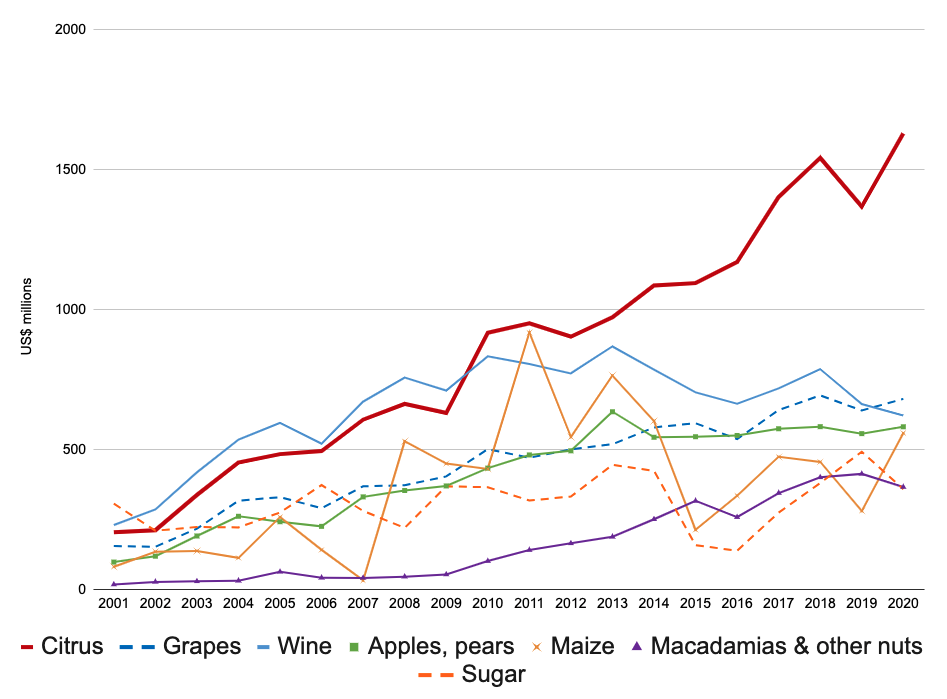BUSINESS MAVERICK OP-ED
Growth coalitions that work? We need to talk about citrus

The stand-out performance of the citrus industry in SA is an export-led success story, which has generated hundreds of thousands of jobs along the value chain. Less well appreciated is the collaborative work that has made this success happen.
Shingie Chisoro-Dube is a researcher at the Centre for Competition Regulation and Economic Development (CCRED), University of Johannesburg. Simon Roberts is professor at CCRED, University of Johannesburg, and visiting professor at the Institute for Innovation and Public Purpose at University College London.
Citrus exports overtook wine as South Africa’s largest agricultural export in 2010 and grew to 2½ times the value of wine exports by 2020 (see graph). The growth in export earnings over the past decade has been driven by higher value “soft citrus” varieties along with lemons and limes, while the growth in the export of oranges was more important in earlier years. South Africa is genuinely a world leader, with improved home-grown varieties and smart agriculture techniques being applied in upgrading production.
South Africa’s top agricultural exports

Source: ITCTradeMap
The output growth and upgrading reflect two critical developments. First, there has been increased planting of varieties responding to changing global demand patterns. Second, more sophisticated capabilities have been developed in terms of the cultivars being planted, farm growing technologies, compliance with phytosanitary standards, and cold-chain logistics and marketing.
The Citrus Growers Association (CGA) has played a key role in effectively coordinating growers and different players along the value chain and has also been central in market access, research and technical support, logistics and transformation. Citrus has huge potential for advancing “land reform with wealth creation”, with efforts by the CGA’s Grower Development Company (GDC) truly bearing fruit.
Coordination and resourcing
The success of the citrus industry rests on investments over time – in capabilities and coordination. Stability in resourcing is essential for this. Funding for the CGA and its programmes has been assured by the government approving a statutory levy on all exported citrus, implemented from 2002.
The levies coming predominantly from the larger growers, who export the most cartons, have been ploughed by the CGA into shared long-term research, market access, digitalisation, skills development and logistics, including an earmarked 20% for black farmers through the GDC.
The budget for the CGA has grown from increases in the levies and the higher levels of exports. Recognition of the importance of the work is further evidenced by the increase in the levy by more than 100%, from 74 cents per every 15kg carton exported in 2020 to R1.64 in 2021.
In addition to the industry export levy being subject to approval by the government, the CGA also works closely with the government on market access, tariffs and trade barriers. These are government-to-government negotiations, with the CGA representing local growers and providing technical support.
Closely related is the CGA’s work on digital systems to improve market access compliance by producers in the value chain. From 2013, the CGA, working with the Department of Agriculture, Land Reform and Rural Development, developed an electronic data-sharing platform called PhytClean for issuing export phytosanitary certification.
Growers, packhouses, exporters and supply-chain service providers use the digital platform technology to capture, store, and report data for export phytosanitary certification. The platform has been rolled out across fruits. This builds on the broad-based support for growers through the Citrus Academy and advisory services.
Growth coalition
The export success requires the industry as a whole to upgrade through strong local linkages. From improved varieties through to investing in systems to ensure compliance with standards and efficient logistics, all activities matter. It is crucial that the CGA is grower-oriented and does not reflect any single dominant interest.
The CGA has set up a number of companies to engage in research, skills development and capacity-building for the sector. These comprise not-for-profit companies, providing shared services and support for growers, and companies run on a commercial basis to provide competitive offerings to growers.
For example, Citrus Research International conducts extensive research on pre- and post-harvest diseases, pests and crop protection for the benefit of the sector as a whole. This is important to maintain market access such as when EU exports were threatened by citrus black spot (CBS). A comprehensive CBS risk management programme has been implemented (CGA, 2020).
The CGA’s role has included shaping markets through regulation and providing greater competition in key industry inputs. The CGA’s Cultivar Company sources and develops cultivars to supply growers on reasonable terms and conditions as an alternative to private commercial companies. Similarly, the CGA formed the River Bioscience company to provide crop protection products to growers in competition with the existing major suppliers.
A key part of the CGA’s work is in supporting the inclusion of black growers in export markets through the work of the GDC, funded by the industry’s export levies and government. The GDC had 145 farmers as members in 2020. The GDC assists growers with production infrastructure, technical and business management support, and achieving regulatory compliance for exporting. Around 75% of the GDC growers exported in 2020, and the overall export volumes of black citrus growers increased by 40% over the 2019-2020 season. Average export volumes per farm are in line with commercial farmers overall.
The inclusion of black citrus growers has, however, been limited by a range of factors that need to be addressed. First, there have been widely reported challenges with the land reform process, including the pace at which it has proceeded, the granting of title deeds, and the provision of appropriate support. These are not specific to citrus. Second, there are challenges in terms of improving the effectiveness of support for the investment and capabilities required to build long-term competitiveness, rather than piecemeal initiatives.
Lessons from the CGA example
The effective coordinating role of the CGA is due to the long-term focus on grower capabilities, oriented to upgrading for export success, with sustained investments in shared services, research and technical capacity.
The CGA is accountable to the growers and has ensured alignment between the government and the industry. This has been essential for opening up new markets and sustaining existing ones, including in establishing the necessary rules and regulations for industry standards and employing advanced capabilities to support certification.
South Africa’s citrus industry provides lessons for other fruits, such as berries and avocados, where there is also huge employment potential with the right interventions. Through linking accelerated land reform with building the capabilities necessary in such high-value products, “land reform for wealth creation” can be achieved. This also requires analysis and investment in water management and technologies to adapt to the effects of climate change.
The dual imperative of charting an inclusive recovery from Covid-19 while facing up to climate change means that coalitions to generate collective solutions and support long-term investments are crucial. Citrus shows what can be achieved in terms of building capabilities and creating jobs when stakeholders pull together, and industry bodies do not simply lobby for the short-term interests of their most powerful members. DM/BM
The contributors write in their personal capacities. This piece draws on research undertaken for a project on Innovation and Inclusive Industrialisation in Agro-processing (2019-2021), funded by the UK Economic and Social Research Council’s (ESRC) Global Challenges Research Fund.




















 Become an Insider
Become an Insider
Comments - Please login in order to comment.